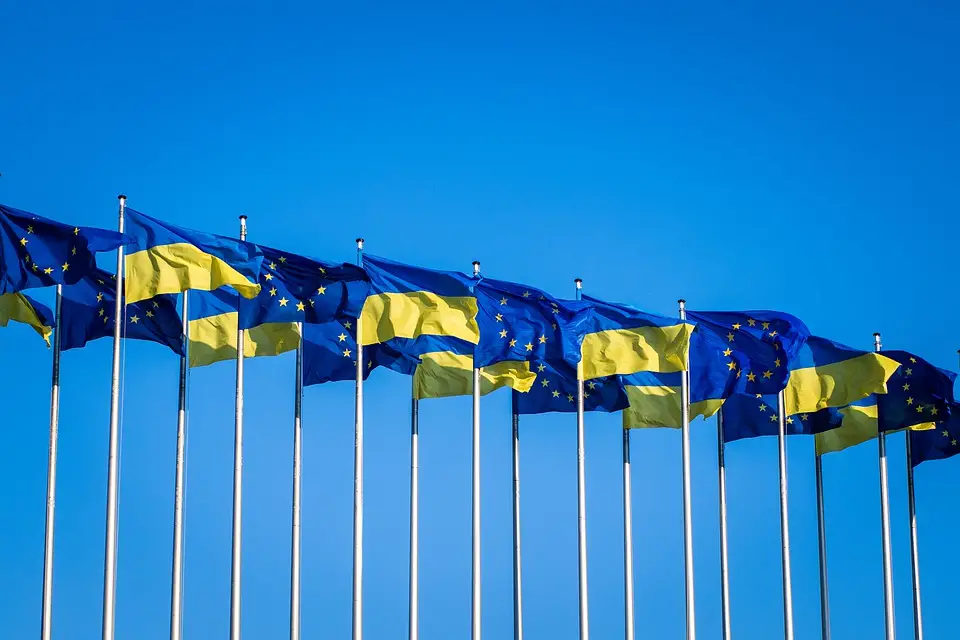As Poslovni Dnevnik/Ana Blaskovic writes, now having an official status of a candidate for membership in the European Union (EU), Ukraine is slowly starting to align its legal acquis with the common European one, despite the ongoing war. The country is roughly where Croatia was back in 2004 in this sense, although it is impossible to predict the political will in the European Union to truly open negotiations with Kiev. Regardless of the circumstances, Ukraine isn’t wasting any time, and representatives of the Ukrainian capital market regulator, the National Securities and Exchange Commission, paid a study visit to the Croatian Financial Services Supervisory Agency (Hanfa) this week.
A technical exchange of knowledge
The visit of the two commissioners, Maksym Libanov and Yurii Boik, is a continuation of the technical cooperation started back in 2019, and the first topics on the table were UCITS and alternative investment funds. As part of the visit, an Agreement on technical cooperation between the two regulators was signed.
“We’ve been in contact with Hanfa for three years now, and since Ukraine received its status as a candidate member state of the EU, we decided to deepen cooperation with European regulators,” Maksym Libanov, whose area of expertise covers corporate management, securities, depository, investments and pension funds, explained. With special permits to leave the country, they arrived in the City of Zagreb. “We were guided by the logic that the Croatian experience, as the youngest EU member state, is very important to us. At the moment, our talks cover the technical exchange of knowledge and experience in the process,” said Libanov, adding that they also met with representatives of ZB Invest and Maverick Wealth Management.
Ukraine has been in a state of emergency since the Russian invasion began back at the end of February, and the UNHCR estimates that nearly seven million people have fled the country. Economic activity is practically devastated, trading on the Ukrainian Stock Exchange was halted on February the 24th (being relaunched only one month with restrictions), and financing depends on injections from the West. Before the war broke out, the Ukrainian economy relied on metallurgy, mining and ore processing in the east and southeast, the territory now under Russian occupation, from where devastating images of Mariupol, the Azovstal iron and steel works being turned into a shelter for civilians and the area of the last stronghold of the Ukrainian Army horrified the world.
Around a third of Ukraine’s GDP was created by agriculture, leading to Ukraine often being called the world’s breadbasket. Back in 2021, Libanov says, about 95 million tonnes of grain, such as wheat and sunflowers, were produced in Ukraine, two-thirds of which went to export markets. According to the UN Food and Agriculture Organisation, 16 percent of the world’s corn production and more than 40 percent of sunflower oil come directly from Ukraine. Moldova alone, for example, gets more than 90 percent of its wheat from nearby Ukrainian fields. Russia’s invasion, in addition to terrorising Ukrainian citizens and seeking to destroy the Ukrainian nationality, also disrupted the world’s grain supply chains and sent food prices sky high.
Despite long-standing political tensions with Russia, the occupation of Crimea back in 2014 and the invasion of Ukraine in February, Ukraine struggled with accumulated economic and social problems. The grey economy, an extremely disordered market, a lot of corruption, the generally low living standards of workers which were even worse for pensioners – this series of events is very well known to other transition countries.
From about 42 to 44 million inhabitants, and this is an estimate because the last census was done in 2001, 20 million Ukrainians are of working age. Among them, only 13 million pay pension contributions, the rest are in the grey echelons of economic activity or outside the labour market, while there are also about 11 million pensioners. With these ratios of employees and dependents, the Ukrainian pension system and the labor market have always been very hot topics. This has especially been the case since the imagined pension system which would have had three pillars never came to fruition. The first pillar of generational solidarity is the only functional one, and the second should have been put into function 2023 if there had been no invasion and no war.
The third pillar, based on voluntary payments, had about 50 funds before the war broke out, but the total assets amounted to only around 150 billion euros, they say. “
This Ukrainian pension system is young and still developing. The average pension is around 2,800 hryvnias, so about 100 euros. The problem is that the average pension is very close to the minimum because many people don’t have documentation about their work before 2004, and there’s no central register,” explained Libanov. His parents’ situation reflects these disparities; the father’s pension is about 3500 hryvnias, while the mother’s is five times higher thanks to her working life spent at the Ukrainian Academy of Science. However, they add that this problem has been present for 30 years now and that a lot has been achieved through digitisation, but the consensus is that the reform of the pension system is an absolute necessity. Croatian experience, as the newest EU member state and a country which was at war just 30 years ago, is invaluable in this regard.
According to a survey conducted among company directors, as many as 39 percent have stopped doing business entirely since the beginning of the Russian invasion, and just 11 percent continued to do business as they did before or increased their activities, stated Yurii Boiko, commissioner for the area of investments, communications and project management. He pointed out that, judging by that survey, we should praise how businesses are coping with the war, illustrating that about two-thirds of people are voluntarily involved in the fighting in some way.
“Undoubtedly, the war affected Ukrainian businesses and the way the economy works. There was a wave of layoffs and 1.28 million people lost their jobs in small and medium-sized companies,” says Boiko.
With a surprising number of parallels that can be drawn between Croatia and Ukraine, we need to look at what reforms are the most desperately needed. Both Ukrainians said that judicial reforms are needed right now. They explained that a number of steps must be taken in the long term for the country to be competitive, attract capital and investors, build infrastructure, but everything is secondary to the functional rule of law. We know very well how true this is in Croatia, which still suffers tremendous problems in this sense to this very day.
For more, make sure to check out our dedicated business and politics sections.









